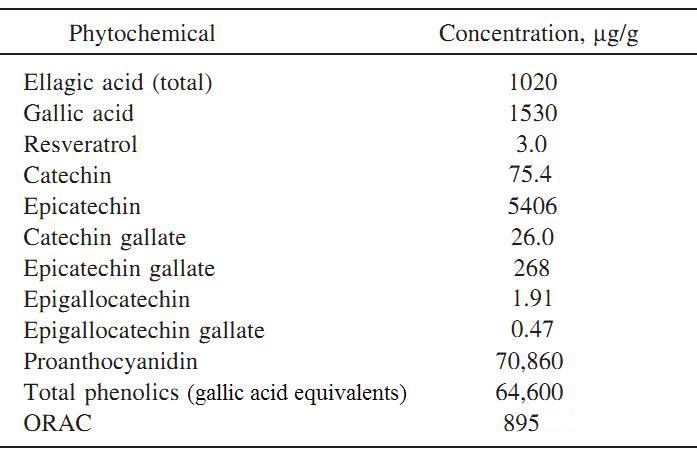Dietary flavonoids are a diverse group of polphenolic plant chemicals that are found in high concentrations in fruits and vegetables. Evidence suggests that flavonoids are important dietary components that decrease the risk of disease. Grapes contain flavonoids in their fruits and seeds and studies have shown benefits to supplements of these components with regard vascular function. These benefits likely derive from modification of the endothelium, as measured by increases in flow mediated dilation. This ability may relate to the ability of flavonoids to increase the availability of nitric oxide in the endothelium through inhibition of oxidative stress, which acts to relax the vasculature locally. Because flavonoids have shown promise as vasoactive compounds, researchers are interested in testing the effects of different plant polyphenols to assess their individual benefits. One such study used the muscadine grape (Vitis rotundifolia) seed extract because of its unique polyphenol composition (figure 1).
 Figure 1. The polyphenol content of the muscadine grape. ORAC = oxygen radical absorbance capacity (micromole Trolox equivalent (TE) / gram1.
Figure 1. The polyphenol content of the muscadine grape. ORAC = oxygen radical absorbance capacity (micromole Trolox equivalent (TE) / gram1.
In the study, which was of a randomised, double-blind placebo-controlled crossover design, 1300mg/d grape seed extract and a placebo were administered to 50 adults with coronary artery disease or with greater than 1 cardiac risk factor for coronary artery disease, for 4 weeks. A 4 week washout period separated the placebo and treatment periods. The primary outcomes were changes in resting brachial diameter and improvements in flow-mediated dilation (FMD). In addition, changes in levels of biomarkers for inflammation, lipid peroxidation and antioxidant capacity were measured. There was no significant change to FMD between the control and treatment groups, but there was a significant increase in the at rest baseline diameter (+4.4%) of the brachial artery in the treatment group. There was also an increase in maximum diameter (4.25 versus 4.43, in control and treatment, respectively). No changes in inflammatory, oxidative or antioxidant status were reported.
These results support previous research showing beneficial changes to the vasculature with supplementation with grape extract containing supplements. However, while previous research has detected an increase to FMD with flavonoid supplementation, no such changes were detected in this study. This may derive from the supplement chosen, and the unique polyphenol composition of the muscadine grape may not be beneficial to FMD. The muscadine grape is characterised by high levels of gallic acid and flavan-3-ols, flavonols, anthocyanins and ellagic acid. There is very little research investigating this unique polyphenol composition on physiological parameters. However, previous studies have shown that improvements in FMD are inversely related to the diameter of the artery at rest. Because the grape seed extract used in this study increased resting diameter of the brachial artery, it could be expected that no further improvements would be seen in response to flow stimulus.
RdB
